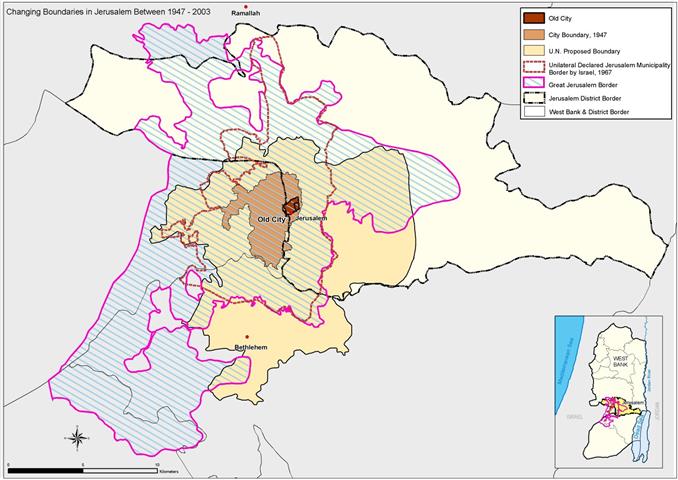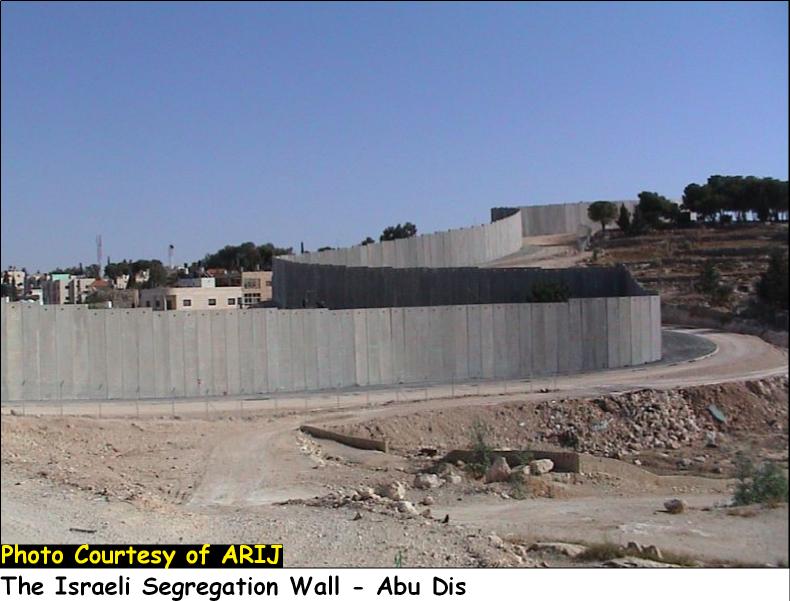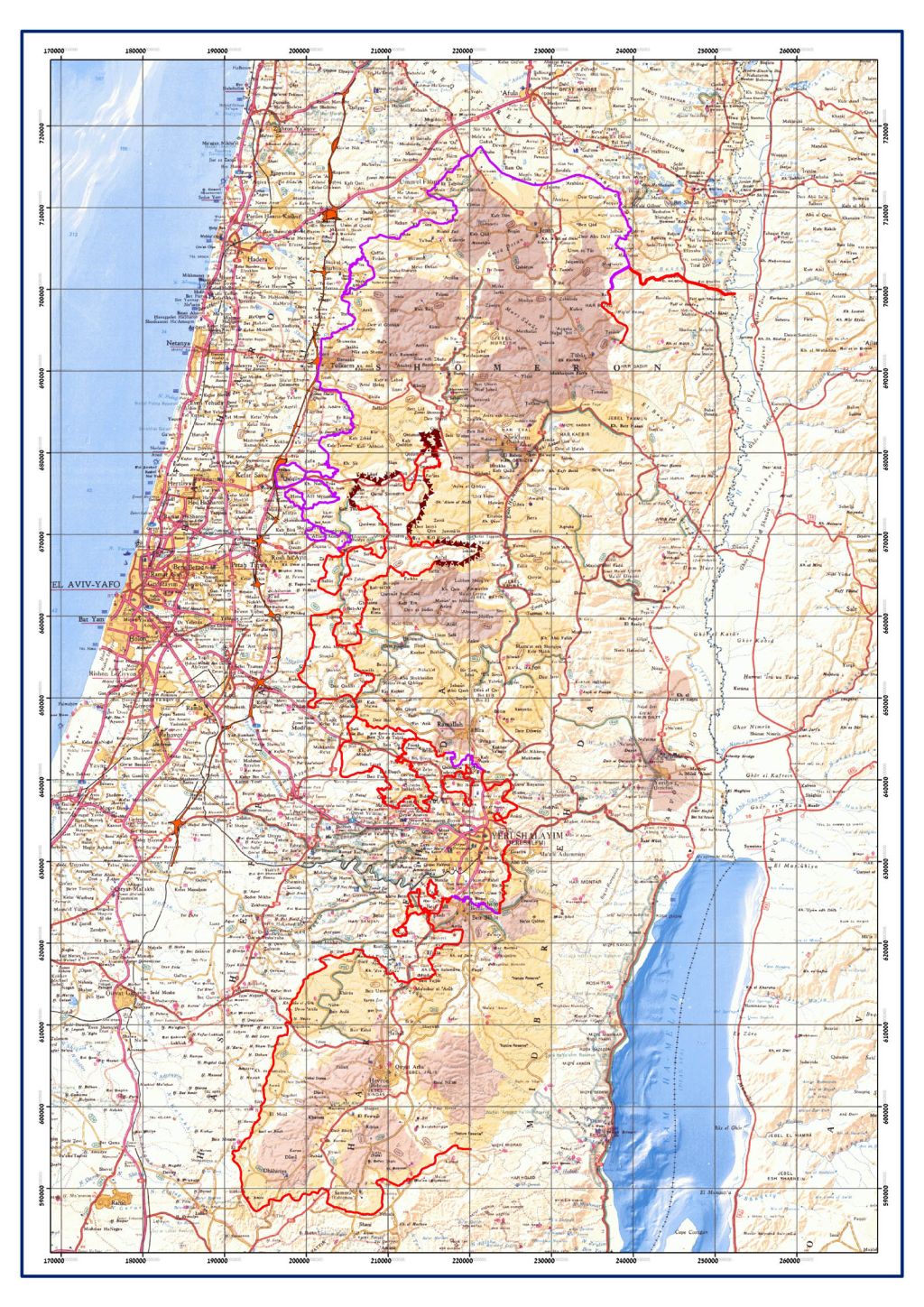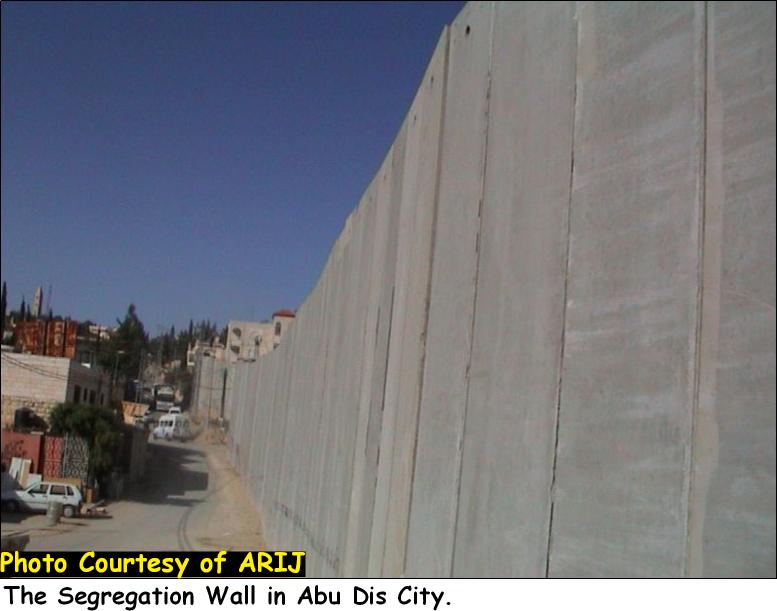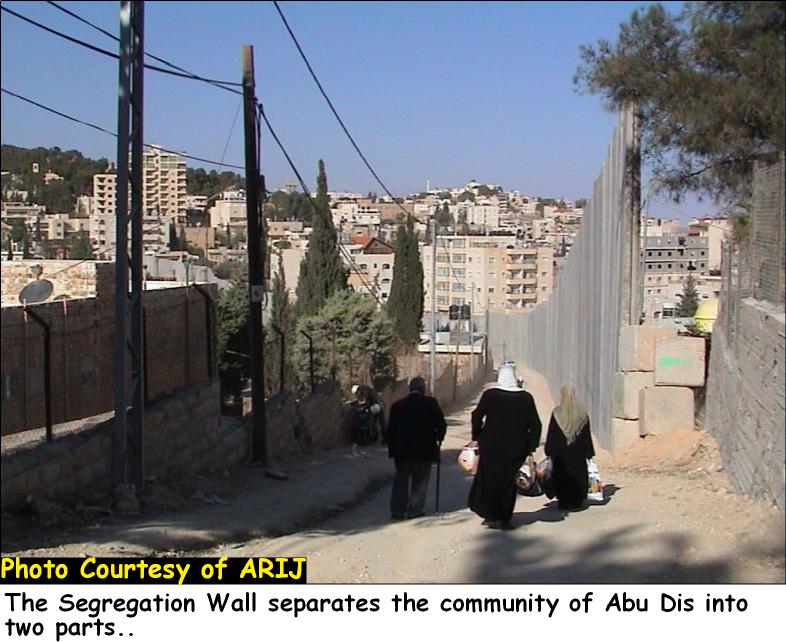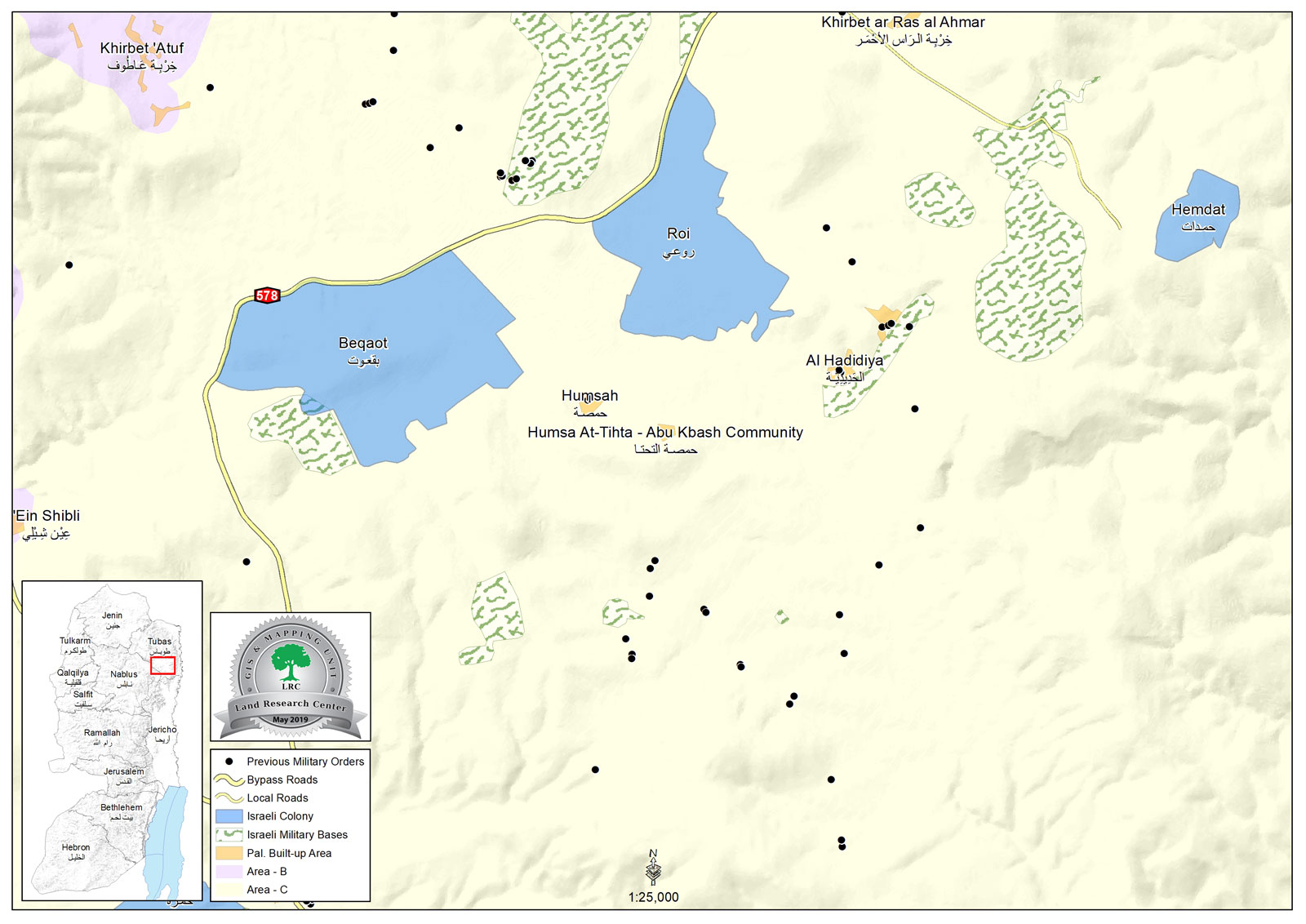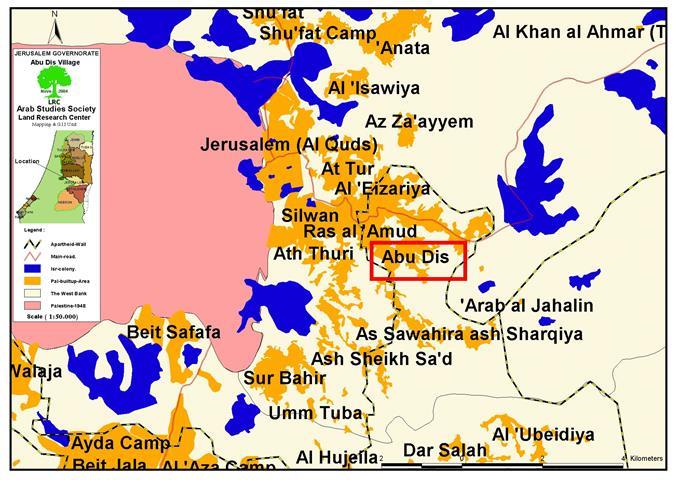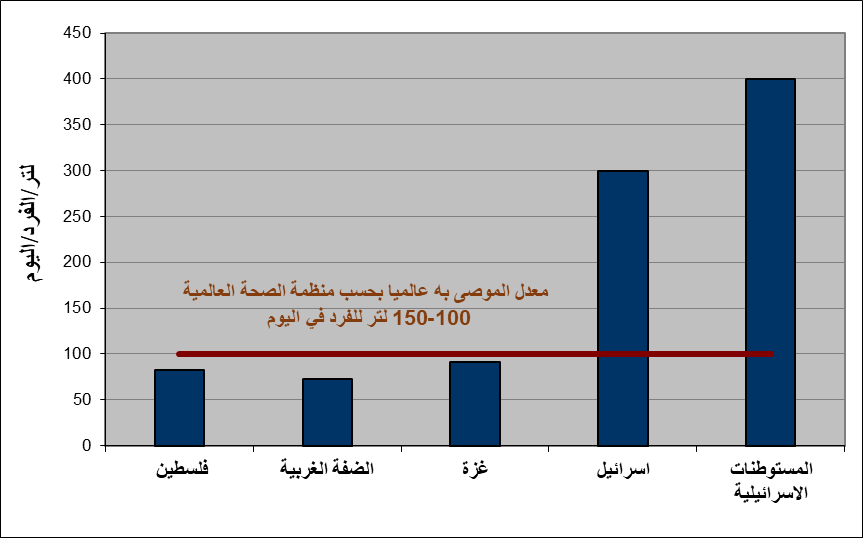Israeli Border Police verbally notified 17 Palestinian families last week that they would be expelled from their homes in the East Jerusalem suburb of Abu Dis. The Border Police, a particularly aggressive branch of the Israeli occupying forces, informed the residents that their homes and property were located on lands claimed by the State of Israel and the families were required to leave the area. Although Abu Dis is completely within the West Bank, the properties are in an area that Israel has illegally and unilaterally annexed as part of the expanded municipal boundaries of Jerusalem. The forceful expulsion of these 17 families is not an isolated incident. Hundreds of Palestinian families living close to the Green Line (Israel's internationally recognized border) and in other strategic areas in the Israeli occupied West Bank and Gaza Strip are under threat of similar action. suburb of Abu Dis. The Border Police, a particularly aggressive branch of the Israeli occupying forces, informed the residents that their homes and property were located on lands claimed by the State of Israel and the families were required to leave the area. Although Abu Dis is completely within the West Bank, the properties are in an area that Israel has illegally and unilaterally annexed as part of the expanded municipal boundaries of Jerusalem. The forceful expulsion of these 17 families is not an isolated incident. Hundreds of Palestinian families living close to the Green Line () and in other strategic areas in the Israeli occupied West Bank and Gaza Strip are under threat of similar action.
The affected families have been living in their houses for decades; some of them have lived on the land since before the emergence of the Israeli State in 1948. However, following the seizure of the West Bank (including East Jerusalem) in 1967, Israel unilaterally and illegally redrew the municipal boundaries of Jerusalem to include new areas within the occupied West Bank. Several times after 1967 Israel made additional changes to the municipal boundaries in order to facilitate the illegal seizure of more occupied Palestinian territory. As a result, sections of Abu Dis now fall within these illegally expanded municipal boundaries. See Map below : Changing boundaries of Jerusalem) in 1967, Israel unilaterally and illegally redrew the municipal boundaries of Jerusalem to include new areas within the occupied West Bank. Several times after 1967 Israel made additional changes to the municipal boundaries in order to facilitate the illegal seizure of more occupied Palestinian territory. As a result, sections of Abu Dis now fall within these illegally expanded municipal boundaries. See Map below :
The Discriminatory Assigned Residency System in East Jerusalem:
According to Israeli law, Palestinians living in East Jerusalem are not citizens of the Israeli State but hold ''permanent resident'' status. Although most 'permanent residents' of East Jerusalem can trace their family's history in the city for generations, their residence status is similar to that granted to foreign citizens living and working in Israel. 'Permanent residents' of East Jerusalem must carry an Israeli-issued identity card granting them less civil and political rights than Israeli citizens, but also differentiating them from other Palestinian residents of the West Bank.
The category of 'permanent resident' was created by Israeli occupation authorities following the 1967 war. At that time Israel organized a census for Jerusalem residents in accordance with the recently expanded illegal municipal boundaries of the city. At the time, many of the Palestinian residents of East Jerusalem, including Abu Dis, were registered and became 'permanent residents' of East Jerusalem. Nevertheless, many Palestinian residents of the city were not present at the time of the survey and were never given 'permanent residence' status. These individuals were categorized as West Bank residents although they continued to live within the illegally expanded East Jerusalem municipal boundaries and pay all due taxes to the occupying Israeli Municipal Administration of Jerusalem. The 17 families who were notified of their expulsion in Abu Dis in October are not categorized as 'permanent residents.' The Israeli occupation authorities are now ordering them to leave their homes and lands and move outside the illegally demarcated municipal boundaries of Jerusalem.
The Israelization of East Jerusalem:
In 1967, East Jerusalem had a Palestinian population of 66,000. There was no Israeli presence in the area Since 1967, however, consecutive Israeli governments have implemented an aggressive policy of Israelization in the city. Illegal Israeli settlements have been built in East Jerusalem in order to increase the Jewish Israeli population, preserve the demographic majority of Jewish Israelis within the municipal boundaries and strengthen Israeli sovereignty over East Jerusalem. There are now 220,000 Jewish Israeli settlers residing in Settlements of East Jerusalem
Meanwhile, Palestinian Jerusalemites have witnessed a set of discriminatory measures gradually adopted and codified in the legal and bureaucratic policies of the Israeli government. Israel has used these measures to limit the natural growth of Jerusalem's Palestinian population and force migration out of the city.
Consecutive Israeli governments have spared little effort in substantially decreasing the number of Palestinians residing in East Jerusalem. Israeli occupation authorities have implemented a series of prejudiced and discriminatory directive measures targeting Palestinians in Jerusalem (both those with 'permanent resident' status and those without). Such policies include, but are not limited to, restriction of residency rights, discriminatory tax systems, restrictions on land use, house demolitions, denial of public funding and investment in civilian infrastructure and the construction of Jewish-only settlements. For more details, click here
In the past decade, the Israeli Ministry of the Interior in occupied East Jerusalem employed further procedures to reduce the number of Palestinian residents in East Jerusalem. The most significant of these recently enacted measures requires Palestinian 'permanent residents' to present documents proving their life-long residency in Jerusalem If residents are not able to present a substantial number of matching documents they will have their 'permanent resident' status revoked and will lose all corresponding rights and benefits, including the right to live in their homes in Jerusalem. These regulations also mean that Palestinian Jerusalemites cannot leave the city for extended periods of time for fear of having their residency rights revoked. The Israeli Ministry of Interior claims that the procedures for investigating and judging residency applications are public knowledge, but they have not published any of the findings or made any attempt to explain the procedure to applicants. When the Interior Ministry revokes the residency of a Palestinian 'permanent resident,' the judgment is given without explanation or reason. For more details, click here
These discriminatory policies are reversed when it comes to Jewish Israeli settlers in East Jerusalem. The construction of illegal Israeli settlements and the appropriation of Palestinian land and homes for use by Israeli settlers are energetically pursued by Israeli occupation authorities, including the Jerusalem Municipal Administration. The vigorous funding of infrastructure for Israeli settlers residing in the Eastern part of Jerusalem aims to emphasize the Israeli presence in Palestinian parts of the city. Furthermore, illegal Jewish Israeli settlers living in East Jerusalem are entitled to leave the city and reside anywhere without the threat of losing their residency rights or the social benefits provided by the Israeli state
Both Palestinian 'permanent residents' and residents which have not been granted special residency status have been targeted for removal by Israeli occupation authorities. The 17 targeted families in Abu Dis share this condition with thousands of other Palestinians who have seen their residency rights revoked and have been forced to leave the illegally expanded municipal boundaries of Jerusalem. As a result, the Israelization policy compromises Palestinian claims to the city and unduly influences the outcome of future negotiations over Jerusalem's status.
The Israeli Segregation Wall in Occupied East Jerusalem:
The Segregation Wall Israel is building on Palestinian land in the West Bank and Gaza Strip is another means which Israeli occupation authorities have employed to appropriate more Palestinian land. In East Jerusalem, the Wall contributes to the Israelization policy by cutting through Palestinian communities in East Jerusalem, severing the city from its most populous Palestinian suburbs. The Wall has had a particularly devastating effect on Palestinian communities living in close proximity to the structure.
Palestinians living in 'the seam zone' between the internationally recognized border of Israel and the path of the Segregation Wall have found themselves cut-off and isolated from their communities and the entire West Bank. Individuals in many of these locations are now required to obtain permits from Israeli occupation authorities simply to reach their homes. Palestinians who enter their communities in 'the seam zone' without valid Israeli permits are charged with illegal entrance and subject to fine and/or detention in Israeli jails.
Palestinians living in 'the seam zone' have found it increasingly hard to obtain the necessary permits. Communities in these areas are also subject to frequent attacks and harassment by Israeli occupying forces as well as land seizure and demolition orders. These vulnerable and isolated Palestinian communities have been targeted by Israeli occupying forces who continue to use every means at their disposal to remove Palestinians from the areas. For more details, click here (The Full extent of the Segregation Zones in the West Bank)
Map of Seam Zone Project as provided by the Israeli Sources
Legend: Purple- completed fence Red- Planned fence Green – Existing roads
In East Jerusalem there are several communities which now face intensifying pressure from Israeli occupying forces attempting to limit the Palestinian population living on the western side of the Segregation Wall. These communities are all within the illegally and unilaterally expanded Jerusalem municipal boundaries and include: Abu Dis (west of Jerusalem), Al-Walajah village (in the Bethlehem District to the southwest of Jerusalem), Ras Khamis (in the northeastern suburb of Shufa't), and Hizma and Bier Nabala (north of Jerusalem).
The 17 families in Abu Dis who received military orders last week have been isolated on the western side of the Segregation Wall. However, since they do not possess 'permanent resident' status in Jerusalem and carry only West Bank IDs, Israeli occupation authorities have demanded that the families leave their homes. The Israeli soldiers notified them that they are now required to move to the eastern side of the Segregation Wall farther within the West Bank. Israeli occupation authorities have not offered any compensation or alternative housing for the families.
Israel's Assigned Residency System and International Law:
Israel's actions in East Jerusalem are in direct violation of numerous United Nations Security Council and General Assembly Resolutions. In particular, UN Security Council Resolution 242 (1967) calls for 'the withdrawal of all Israeli armed forces from the territories occupied' in the 1967 war; and UN Security Council Resolution 465 (1980) applies these principles more directly and forcefully to East Jerusalem, stating: 'all measures taken by Israel to change the physical character, demographic composition, institutional structure or status of the Palestinian and other Arab territories occupied since 1967, including Jerusalem, or any part thereof, have no legal validity.'
In addition, as an occupying power, Israel is bound by the application of international humanitarian and human rights law. The assigned residency system in East Jerusalem is a particularly egregious violation of the Fourth Geneva Convention of 1949. For instance, the conditions Israeli occupation authorities set on attaining 'permanent residence' status in East Jerusalem have separated families and made it difficult for them to reunite. Although there are procedures for family reunification, the application process is long and unnecessary difficulties are common. As a party to the Convention, Israel is bound to extend all possible assistance to families living in occupied territories and separated by war. This principle is codified in the Additional Protocol to the Convention, which states: ''The High Contracting Parties and the Parties to the conflict shall facilitate in every possible way the reunion of families dispersed as a result of armed conflicts'' (Protocol I, 8 June 1977, Article 74).
Although Israel has unilaterally annexed Palestinian land in East Jerusalem, this annexation is a blatant violation of UN Security Council Resolutions 242 and 465 and has not changed East Jerusalem's status under international law. Even if the illegal annexation of the territory were to be accepted, Israel could not escape the application of the Fourth Geneva Convention. Article 47 of the convention clearly explains: ''Protected persons who are in occupied territory shall not be deprived, in any case or in any manner whatsoever, of the benefits of the present Convention by any change introduced, as the result of the occupation of a territory, into the institutions or government of the said territory, nor by any agreement concluded between the authorities of the occupied territories and the Occupying Power, nor by any annexation by the latter of the whole or part of the occupied territory.''
The forced expulsion of the 17 families in Abu Dis, in particular, violates some of the most fundamental rights protected under the Fourth Geneva Convention. The Palestinian residents of East Jerusalem, including Abu Dis, are the original inhabitants of the city, thus Israel's attempt to force them to leave the territory is a breach of Articles 49 and 147 which prohibit the 'transfer' of the occupied population from one area to another Article 147 also defines this 'transfer' as a 'grave breach' of the convention. Grave Breaches are defined as war crimes and subject to criminal sanction.
The prohibitions outlined in Article 147 are strengthened by the Judgment of the Nuremberg Tribunal (1950) which clearly defines deportation as a ''war crime'' and a 'crime against humanity.' Article 6 of the Judgment states: 'the crimes hereinafter set out are punishable as crimes under international law; crimes against humanity: Murder, extermination, enslavement, deportation and other inhuman acts done against any civilian population, or persecutions on political, racial or religious grounds, when such acts are done or such persecutions are carried on in execution of, or in connexion with any crime against peace or any war crime' (Article 6; section C).
Conclusion:
The forced expulsion of the 17 Palestinian families in Abu Dis is a direct and flagrant violation of international law, particularly the Fourth Geneva Convention of 1949. All serious interpretations of the Convention and related laws regarding the deportation of civilians from an occupied territory conclude that such action is strictly forbidden. Israeli occupation authorities, however, continue to enforce the expulsion orders and deportations, particularly from Palestinian communities in strategic areas such as sections of illegally annexed East Jerusalem and the 'seam zone' between the internationally recognized border of Israel and the Segregation Wall. Article 147 of the Fourth Geneva Convention, clearly defines such deportations and expulsions as 'grave breaches' of the Convention. 'Grave breaches' of the Geneva Convention are punishable as war crimes and the Nuremberg Judgment defines the transfer also as a 'crime against humanity.' However, Israeli occupation authorities have never been held accountable for these crimes and continue to systematically erode the rights of the occupied Palestinian population.
From the time that Israel seized and occupied East Jerusalem in 1967, consecutive Israeli governments have adopted increasingly complex military, legal and bureaucratic methods to limit Palestinian residency rights and enforce the expulsion of as much of Jerusalem's Palestinian population as possible. In pursuing this end, Israeli occupation authorities have employed all kinds of rules and regulations, manipulated court judgments and applied brutal military operations, all intended to uproot thousands of Palestinians from the houses and land their families have lived in for generations.
Israeli occupation authorities, principally acting through the office of the East Jerusalem Ministry of the Interior, have tailored a detailed set of discriminatory rules and regulations that, among other things, require Palestinian residents of East Jerusalem to prove the history of their residence in Jerusalem in order for them to continue living in the city. If Palestinians are not able to provide the details of their residency, the government of Israel reserves the right to strip them of their residency status. Those who are not recognized as 'permanent residents' of East Jerusalem are prohibited from living in the city and are subject to the type of expulsions and deportations that were served to the 17 families in Abu Dis this week.
In addition to the assigned residency program, Israeli occupation authorities have employed various other techniques to force the Palestinians residents of East Jerusalem out the city. Such Israeli policies include discriminatory tax systems, restrictions on land use, house demolitions, denial of public funding and investment in civilian infrastructure and the construction of Jewish-only settlements. This methodical Israeli campaign to diminish the Palestinian existence in East Jerusalem has resulted in the deportation of thousands of Palestinians from the city since 1967. These regulations have been applied in an overtly discriminatory manner as they exclude completely more than 220,000 Jewish Israeli settlers (ARIJ Database (2004)) living in illegal Israeli settlements in East Jerusalem.
The discriminatory application of these regulations is intended to consolidate and strengthen the Jewish Israeli demographic majority within the illegally expanded municipal boundaries of Jerusalem. The Israeli government actively encourages, supports and defends illegal Jewish Israeli settlers in East Jerusalem while simultaneously forcing Palestinians to leave the city. The segregation Wall has been used as an additional method to facilitate the removal of Palestinian civilians. Palestinians living in the vicinity of the Wall, like the families in Abu Dis, have faced additional hardships and exceptional pressure to leave their homes and lands. The sustained and systematic attempts by Israeli occupation authorities to remove Palestinians from East Jerusalem, and other strategic areas, constitutes a policy of slow, but deliberate, ethnic cleansing. The 17 families targeted for removal last week in Abu Dis are the latest victims of this systematic Israeli policy.
Related Articles :-
- Victims of the Israeli Segregation Wall … A Humane Perspective .. October 16,2003
- Abu Dis: A Palestinian Town Tarred by the Israeli Wall … February 4, 2004
- Reinforcing the Jewish existence in East Jerusalem … May 13, 2004
- New Developments on the East & Southeast Terrains of Bethlehem Governorate … July 15, 2004
- Ar Ram: a Palestinian town facing the threat of the Segregation Wall … August 14, 2004
- Israeli campaign of house demolition, closure and seizure in East Jerusalem during the first seven months of 2004 … September 7, 2004
- Israel Continues to Build Illegal Settlements in Occupied Jerusalem, October 2004.
-
Israel continues to Cram Jewish settlers into Jerusalem, October 2004.
:::::::::::::___
References:-
[1] According to a 1967 census by the Israeli government, 44,000 people lived within the pre-1967 borders of East Jerusalem and an additional 22,000 lived in the illegally expanded municipal boundary (source: PASSIA Factsheet 14.2; Jerusalem, Population. www.passia.org ).
[2] Source: ARIJ database (2004).
[3] 'Permanent residents' are required to present several documents, including the title deed of their house, utility bills, rent or lease contracts, tax receipts, etc.
[4] The Israeli Ministry of the Interior argues that Palestinian rights are different because Palestinians are only 'permanent residents', unlike Jewish settlers who are lawful citizens of the Israeli State. The Ministry asserts that Palestinians would be treated equally if they became citizens of Israel. However, additional restrictions imposed on Palestinians seeking Israeli citizenship make that a difficult task. For instance, Palestinians, who are residents of occupied territory, would be forced to swear allegiance to Israel. This requirement constitutes a coercive act in violation of the basic rights of an occupied population as stated in the Hague Regulation of 1907: ''it is forbidden to compel residents of occupied territory to swear allegiance to the hostile power'' (Chapter V, Section III, Article 45).
[5] Article 49 states ''Individual or mass forcible transfers, as well as deportations of protected persons from occupied territory to the territory of the Occupying Power or to that of any other country, occupied or not, are prohibited, regardless of their motive.'
Prepared by:
The Applied Research Institute – Jerusalem


